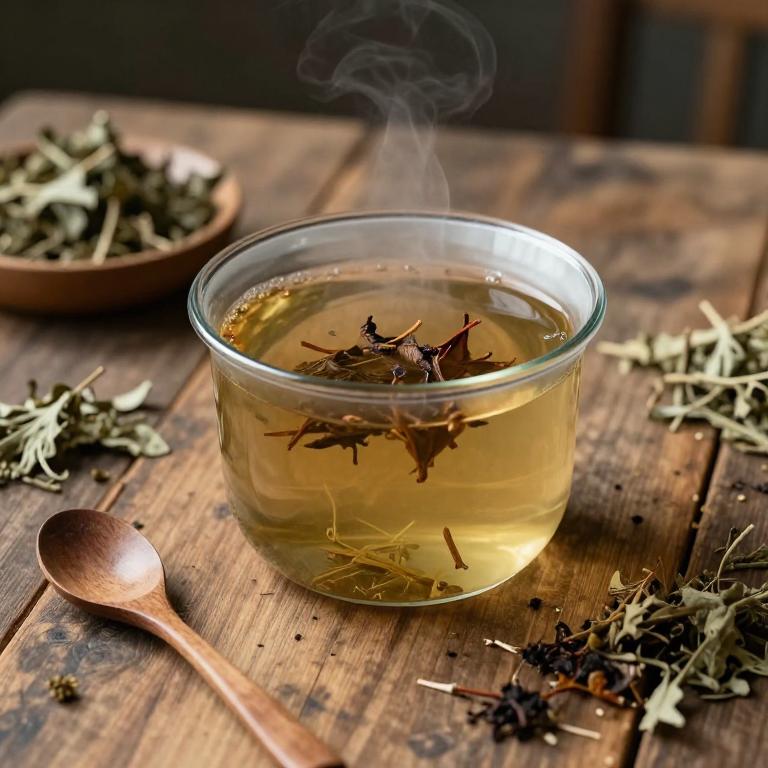10 Best Herbal Decoctions For Swollen Gums

Herbal decoctions have been traditionally used to alleviate symptoms of swollen gums due to their anti-inflammatory and antimicrobial properties.
Commonly used herbs include sage, echinacea, and goldenseal, which are known for their ability to reduce inflammation and combat bacterial infections. To prepare a decoction, these herbs are typically simmered in water for several minutes to extract their active compounds. The resulting liquid can be used as a mouth rinse or applied directly to the affected area with a clean cloth or swab.
Regular use of such herbal decoctions may help soothe irritation, reduce swelling, and promote healing in cases of gingivitis or minor gum infections.
Table of Contents
- 1. Salvia (Salvia officinalis)
- 2. St. john's wort (Hypericum perforatum)
- 3. Echinacea (Echinacea purpurea)
- 4. Stinging nettle (Urtica dioica)
- 5. Marigold (Calendula officinalis)
- 6. German chamomile (Chamomilla recutita)
- 7. Aloe vera (Aloe barbadensis)
- 8. Rosemary (Rosmarinus officinalis)
- 9. Oregano (Origanum vulgare)
- 10. Ceylon cinnamon (Cinnamomum verum)
1. Salvia (Salvia officinalis)

Salvia officinalis, commonly known as sage, has been traditionally used in herbal medicine for its anti-inflammatory and antimicrobial properties.
When prepared as a decoction, sage can help reduce swelling and inflammation associated with gum issues. The active compounds in sage, such as rosmarinic acid and flavonoids, contribute to its ability to soothe irritated gum tissues. To make a sage decoction, fresh or dried leaves are boiled in water and then strained.
Regular use of this herbal remedy may support oral health and provide relief for individuals suffering from swollen gums.
2. St. john's wort (Hypericum perforatum)

Hypericum perforatum, commonly known as St. John's Wort, is traditionally used in herbal medicine for its anti-inflammatory and antimicrobial properties.
When prepared as a decoction, it can help reduce inflammation and infection in the gums, making it a potential remedy for swollen gums. The active compounds in hypericum, such as hypericin and flavonoids, contribute to its ability to soothe irritated tissues and promote healing. To use it for swollen gums, the herb is typically boiled in water to extract its beneficial compounds, then cooled and applied as a mouth rinse or compress.
While it may offer relief, it is important to consult a healthcare professional before using it, especially if taking other medications, due to potential interactions.
3. Echinacea (Echinacea purpurea)

Echinacea purpurea, commonly known as purple coneflower, has been traditionally used for its immune-boosting properties, and recent studies suggest it may also be beneficial for reducing inflammation associated with swollen gums.
When prepared as a herbal decoction, echinacea purpurea can be used as a natural remedy to soothe gum irritation and reduce redness. The active compounds in echinacea, such as alkamides and polysaccharides, are believed to have anti-inflammatory and antimicrobial effects that help combat oral infections. To prepare the decoction, dried echinacea roots or flowers are simmered in water for several minutes, then strained and used as a mouth rinse or topical application.
While echinacea may offer some relief for swollen gums, it is important to consult with a healthcare professional before using it, especially if there are underlying health conditions or if symptoms persist.
4. Stinging nettle (Urtica dioica)

Urtica dioica, commonly known as stinging nettle, has been traditionally used in herbal medicine for its anti-inflammatory properties.
When prepared as a herbal decoction, it can help reduce swelling and inflammation in the gums due to its high concentration of minerals and bioactive compounds. To make the decoction, fresh or dried nettle leaves are boiled in water for several minutes, then strained and cooled. This preparation can be used as a mouth rinse or applied topically to the affected areas.
While generally safe, it is advisable to consult a healthcare professional before using nettle decoctions, especially for those with allergies or existing medical conditions.
5. Marigold (Calendula officinalis)

Calendula officinalis, commonly known as pot marigold, has been traditionally used for its anti-inflammatory and antimicrobial properties, making it a valuable herb for addressing swollen gums.
Herbal decoctions made from dried calendula flowers can be prepared by simmering the flowers in water for several minutes, allowing the active compounds to infuse into the liquid. These decoctions may help reduce gum inflammation, soothe irritation, and promote healing due to the presence of flavonoids and triterpenes. When used as a mouth rinse or applied topically, calendula decoctions can provide natural relief for gum conditions such as gingivitis.
However, it is advisable to consult a healthcare professional before using calendula for persistent or severe gum issues to ensure safety and effectiveness.
6. German chamomile (Chamomilla recutita)

Chamomilla recutita, commonly known as German chamomile, has been traditionally used for its anti-inflammatory and soothing properties, making it a popular choice for addressing swollen gums.
Herbal decoctions made from chamomilla recutita can be prepared by steeping the dried flowers in hot water, creating a calming tea that may help reduce gum inflammation and promote healing. The active compounds in chamomile, such as flavonoids and essential oils, contribute to its ability to alleviate pain and reduce bacterial growth in the mouth. When used as a mouth rinse or applied directly to the gums, chamomile decoctions can provide localized relief and support oral hygiene.
However, it is advisable to consult a healthcare professional before using chamomile, especially if symptoms persist or if you have known allergies to plants in the daisy family.
7. Aloe vera (Aloe barbadensis)

Aloe barbadensis, commonly known as aloe vera, has been traditionally used for its soothing and anti-inflammatory properties, making it a popular choice in herbal decoctions for treating swollen gums.
When prepared as a decoction, aloe vera can be infused with water or other herbal ingredients to create a calming oral rinse that helps reduce gum inflammation and promote healing. The gel from the aloe leaf contains compounds like polysaccharides and enzymes that may help fight bacteria and reduce irritation in the mouth. While it is generally considered safe for topical use, it is important to avoid ingesting large amounts of aloe vera, as it can have laxative effects when consumed internally.
For best results, aloe-based decoctions should be used in conjunction with good oral hygiene practices and, if necessary, under the guidance of a healthcare professional.
8. Rosemary (Rosmarinus officinalis)

Rosmarinus officinalis, commonly known as rosemary, has been traditionally used in herbal medicine for its anti-inflammatory and antimicrobial properties.
When prepared as a decoction, rosemary can help reduce inflammation and swelling in the gums by inhibiting the growth of bacteria that contribute to gum disease. The active compounds in rosemary, such as rosmarinic acid and carnosic acid, possess potent antioxidant effects that support gum health. To use rosemary decoction for swollen gums, it can be applied as a mouth rinse or gently swished around the affected areas.
However, it is important to consult with a healthcare professional before using it, especially if you have existing oral health conditions or are taking medications.
9. Oregano (Origanum vulgare)

Origanum vulgare, commonly known as oregano, has been traditionally used in herbal medicine for its anti-inflammatory and antimicrobial properties.
Herbal decoctions made from dried oregano leaves can help reduce inflammation and infection in swollen gums due to the presence of compounds like carvacrol and thymol. These decoctions are typically prepared by simmering the dried leaves in water for several minutes to extract the active components. The antimicrobial action of oregano may help combat bacteria that contribute to gum disease, while its anti-inflammatory effects can alleviate discomfort and swelling.
However, it is important to consult a healthcare professional before using oregano decoctions, especially for prolonged periods or in conjunction with other medications.
10. Ceylon cinnamon (Cinnamomum verum)

Cinnamomum verum, commonly known as true cinnamon, has been traditionally used in herbal medicine for its anti-inflammatory and antimicrobial properties.
When prepared as a herbal decoction, it can help reduce inflammation and alleviate pain associated with swollen gums. The active compounds in cinnamon, such as cinnamaldehyde and eugenol, contribute to its ability to combat bacterial growth and soothe irritated tissues. To prepare the decoction, cinnamon bark is simmered in water for several minutes, allowing the beneficial compounds to infuse into the liquid.
Regular use of this decoction as a mouth rinse or topical application may support gum health and aid in the management of mild gingival inflammation.